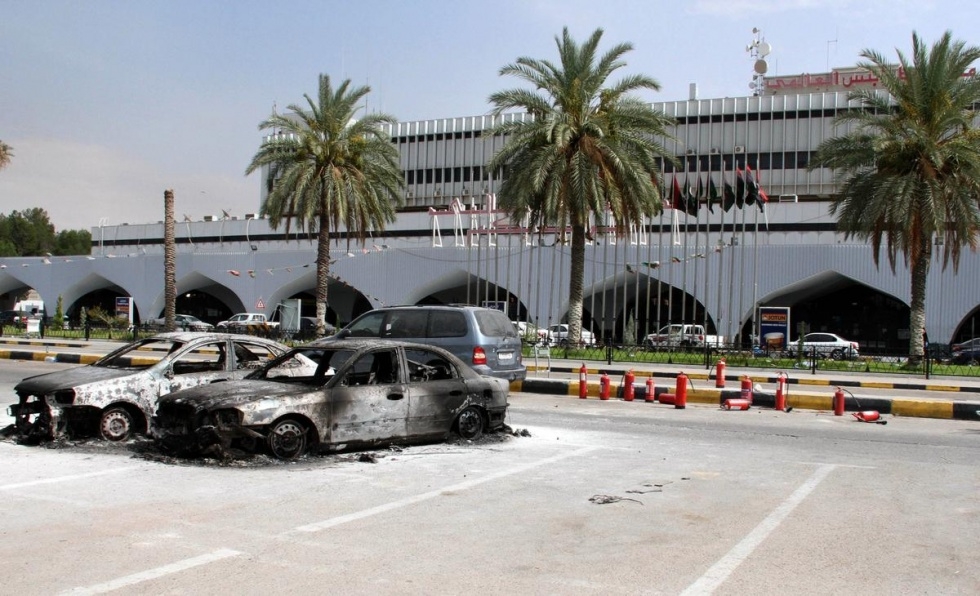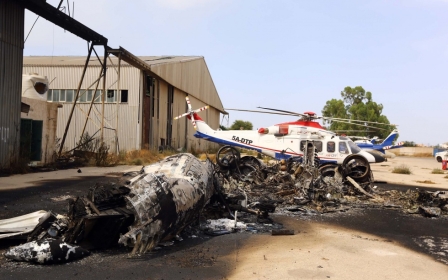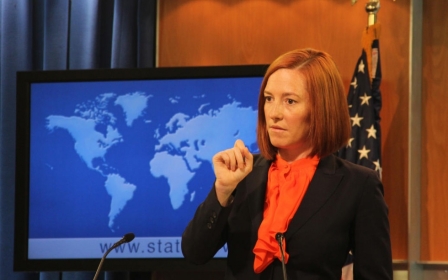Tripoli airport becomes latest front in Haftar’s offensive

The closure of Tripoli international airport after a rocket barrage destroyed planes and the control tower is the latest twist in a battle between Islamists and the forces of former general Khalifa Haftar that has evolved into a blood-drenched stalemate.
Haftar, a 71-year-old retired general, triggered the fighting on 16 May, launching Operation Dignity with the aim, in his words, of ridding Libya of “jihadists”.
It began with air force units aligned with him bombing bases of Islamist militias Ansar al-Sharia, February 17 and Libya Shield in Benghazi in several days of fierce fighting. That same month in Tripoli, militia units aligned with him from the mountain town of Zintan stormed the country’s Islamist-led congress.
Since May, fighting between the two sides has escalated, culminating in the 12 July attack by Islamists and allied militias from Misrata, 120 miles (193 km) east of Tripoli, on militias from Zintan who hold the airport.
The attack failed to capture the airport, but strikes by grad missiles, artillery and anti-aircraft guns have left at least six dead, destroyed 10 planes and wrecked the control tower. With staff too frightened to journey to the airport, air traffic control for western Libya has broken down and the airspace has closed.
In Benghazi the fighting has seen grad rockets destroy the recently re-opened departure hall at the city’s Benina airport. Regular army special forces allied with Haftar are fighting Ansar al-Sharia for control of the city’s Jala hospital. As with the battle for Tripoli airport, this fighting has ended up destroying much of the facility both sides covet.
Haftar’s offensive has left more than 200 dead in Benghazi, but has not yet succeeded in its aim of triggering a general uprising against Islamists.
Most Libyans remain on the sidelines, and the reason is not affection for Islamist militias but uncertainty about Haftar himself.
The silver-haired pensioner is a controversial figure, as result of his complicated history. In 1969, he joined army officers supporting the coup by Colonel Muammar Gaddafi which toppled King Idris.
Haftar’s reward was to be appointed commander of Gaddafi’s ill-fated invasion of Chad in the 1980s, the so-called Toyota War. In that war Chadians, backed by Paris and Washington, proved more adept at mobile war than Haftar’s forces, overrunning Libya’s key air base and making him their prisoner.
In captivity, disowned by Gaddafi, Haftar switched sides, joining a CIA-trained brigade of Libyan exiles that Washington hoped would one day spark an uprising against Gaddafi.
But the unit was later disbanded and while America made its peace with Gaddafi, Haftar moved to Langley Virginia, settling into exile a few miles from CIA headquarters.
He returned to Libya in 2011 to lead rebel forces, but the rebels handed the top job to his rival, Abdul Fatah Younes, who had defected from his post as Gaddafi’s Interior Minister. Younes was assassinated in July that year, but the rebels still refused to promote Haftar, and with the end of the uprising he drifted into obscurity.
Haftar bounced back in February, appearing on TV in full uniform to denounce Libya’s Islamist-led national congress as corrupt and calling for a coup. This coup failed to materialize, and he vanished again, until Operation Dignity three months later.
The Dignity operation is popular with Libyans who blame militias - not just Islamist ones - for bringing violence to the country and scaring away foreign investors. But Haftar’s personal support remains slender; it is common to see protests in Tripoli and other major cities carrying Dignity banners, but few of those protestors also have photographs showing Haftar.
The former general himself is based in Marj, a small town outside Benghazi, in a headquarters guarded by tanks after a suicide car bomber attacked his previous base last month.
He insists his operation remains on course to “cleanse” jihadists, singling out Ansar al Sharia, the militia blamed by America for the attack on its Benghazi consulate in 2012 that saw the death of ambassador Chris Stevens and three officials.
His attacks on Ansar al Sharia won guarded praise from America’s Libya ambassador Deborah Jones, who said during a talk in Washington’s Stimson Centre last month: “Frankly its not necessarily for me to condemn his actions in going against very specific groups.”
Haftar denies being in contact with the CIA, although the United States took advantage of the Benghazi fighting in June to send commandos to arrest an Ansar al Sharia commander, Ahmed Abu Khattala, wanted for the Stevens killing.
There are superficial comparisons between Haftar and Egypt’s general Abdel Fattah Al Sisi, who helped lead the overthrow of the Muslim Brotherhood government in Cairo last year in what some call a coup and others a revolution.
But there are key differences. For one thing, politics in Libya is a minority game. Neither Haftar nor the Islamists enjoy mass support, and both rely on unstable coalitions
Misrata, Libya’s third city and its business capital, is allied with the Islamists less out of ideological agreement than practical realities, with its traders fearing Haftar favors the old Gaddafi-era business elite.
Haftar, on the other hand, has support from eastern tribes, the powerful militia from Zintan, and the centre-right National Forces Alliance headed by Mahmoud Jibril, a former advisor to Gaddafi and also the first rebel prime minister. One sign of this instability is that two years ago Zintan militiamen in Tripoli shot and wounded one of Haftar’s sons and briefly kidnapped a second.
Libyans may wonder where their government is in all this, and the answer is nowhere. Its newly trained army and police forces have melted away in the face of the militia battles, with caretaker prime minister Abdullah al Thinni calling for foreign intervention. Abroad, there is little appetite for such intervention, particularly because Libya’s conflict is so multi-layered.
Libya, meanwhile, continues to deteriorate. It is unclear whether promises by eastern rebel militias to end an 11-month blockade of eastern ports will materialize, but the blockade has already starved the country of revenue. Ordinary Libyans cope with a crumbling economy, power cuts and petrol shortages.
The wonder is that they cope at all. Detonations from Monday’s airport bombardment mingled with the crackle of fireworks and roars of motorbikes racing each other in the central Martyr’s Square, with many ordinary Tripolitanians determined to ignore the fighting. “Militia fighting is a fact of life, you just try and ignore it,” said a student, Mohammed, relaxing near the beach at Tajoura, in the peaceful east of the city. City coffee bars remain open doing a roaring evening trade, while in Benghazi shoppers flock to a new shopping mall, the first ever built in the city, oblivious of air strikes going in a few miles away.
Much will depend on the new parliament, the House of Representatives, elected on 25 June and due to take office on 1 August in Benghazi. With political parties excluded, it is unclear what political complexion the 200-seat house will have. But its number one task will be finding a way to tame the militias, or see Libya spin ever further into chaos.
New MEE newsletter: Jerusalem Dispatch
Sign up to get the latest insights and analysis on Israel-Palestine, alongside Turkey Unpacked and other MEE newsletters
Middle East Eye delivers independent and unrivalled coverage and analysis of the Middle East, North Africa and beyond. To learn more about republishing this content and the associated fees, please fill out this form. More about MEE can be found here.



